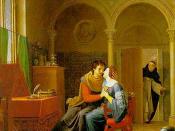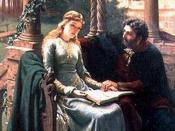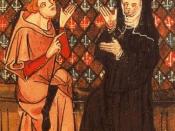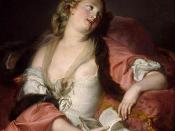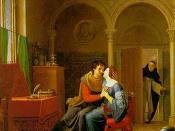Abelard and Heloise It's interesting that Peter Abelard, although considering himself a devout religious man, had the ability to frontier a philosophical movement that cultivated a nothing-is-sacred position towards the Catholic Church. Abelard's Aristotelian views of Nominalism, and then new idea Conceptualism taught people to disregard the idea of a universal, instead flaunting abstracts in nature as supreme, and the idea of universals were merely pseudo-intellectual talk(Gans, Anthropoetics.ucla.edu). The mere roots of this arguments display Abelard's passion to use fact (abstracts or individual objects) to contradict and out-argue his teachers (universals). Abelard's arguments can still be seen today floating around in modern religious debate, I found them in a Catholic encyclopedia-- a nexus for theological confusion-- but a true thermometer for the affect of the church on Abelard is the marriage to his student Heloise. Moreover, Abelard and Heloise's attraction, intensified by their common interests and status, was nullified by a devotion to an overriding faith; Even though they knew this, they still shared a common love.
The Church, Abelard, and Heloise After reading The Historia Calamitatum, it seems as though what Peter Abelard needed was a taste of his own medicine. As Abelard writes, he is not too shy about his ability to out-argue his teachers and win over the students of the time, stating several times that his teachers were either too slow or stupid to understand the concepts. But as Abelard taught his philosophies, he tempted fate with Heloise. Heloise's pregnancy and eventual secret marriage shows a side of Abelard that wasn't prevalent in the universities-- Abelard and Heloise now seem more conservative then before.
Abelard and Heloise were a perfect example of the effect of Catholicism on Medieval thought. Although the philosophies of Abelard and Heloise differed from the public, or between the two, they participated in a secret marriage, Heloise became a nun, and Abelard became a monk regardless. Their beliefs could vary, but deep within the two had to faithfully follow the cultural beliefs of society.
Abelard's taste of his own medicine comes in Historia Calamitatum-- after Heloise has left, Abelard is castrated. I say this, not because he deserved it (or I'm in trouble), but the actions of Heloise's family are the logical step of society at the period. Abelard's Nominalism taught that he could tear down everything that was sacred within the culture, it seemed to be the very theme within Historia Calamitatum, yet when he oversteps his bounds, Abelard and Heloise follow their beliefs with amazing perception(Gans, Anthropoetics.ucla.edu).
I stumbled upon this French poem while I was on the internet, I thought it exemplified the situation well: Where is the very good/wise Heloise For whom was castrated and then a monk Pierre Abelard at Saint-Denis For his love he paid that penalty.(Villon) Abelard and Heloise could not escape the culture with which they were confined.
Writing Letters I'm not trying to demean Abelard and Heloise's personal philosophy or de-romanticize by subjugating them to their own cultures. Abelard and Heloise did have a true belief in their religion-- both considered themselves devout, and when their positions as monk and nun were decided, both expressed an understanding that they were, to some extent, doing what was right. Loving each other on a different level, Abelard sometimes referred to him, as the introduction to Historia Calamitatum says, as her "ÃÂSister in Christ' and Heloise said: "I am yours."�-- Abelard and Heloise felt the tragedy of their relationship cut short.
These letters that Abelard and Heloise wrote to each other were a clear indication of the personal feelings that each of them felt, disregarding the passions that had put them in their situation. Heloise in a letter stated: "I denied myself every pleasure in obedience to your will."� and later, talking of her work, she is says it helps her reach: "a calm of mind, all passion spent."� With lust losing itself in the picture, Abelard and Heloise are free to write of other things.
In their personal letters both Abelard and Heloise began a religious debate centered around the man and the woman. Intrinsic to Medieval Catholic ideology, Heloise relates the idea that women are intellectually the inferior of men; Abelard after years of teaching the New Testament and the style's of Sic et Non, tries to relate the idea of women being men's intellectual equals, and in the eyes of God, more sacred. Both Abelard and Heloise, knowledgeable in scripture, differed in their perspective-- Heloise used the more traditional Old Testament, Abelard the more progressive New Testament; Abelard talked of the meekness in women as a gift of spirituality, Heloise recognized it as a correct subjective part of culture. The irony of gender reversal, Abelard supporting the Women, Heloise supporting the Men, seems, strange, but it reinforced their ideals: Abelard philosophies tore down the ideas that Euro-Catholic ideals had taught Heloise to believe. The real irony is both used the same scriptures to reinforce their beliefs.
When I studied this I found a bit of controversy, everyone loves controversy, concerning some of the letters. There was a bit concerning authenticity, that Abelard might have forged a few lost ones, then a few other people during the fourteenth and fifteenth, I'm sure you've heard this. I've read a few opinions that state Abelard might have used the letters from Abelard to counterpart his arguments about women, but most of these arguments I read seemed vague, and it seems that most of these arguments were shot down. If so, why were they buried together--what truth would their life have? I have trouble believing it.
Abelard and Heloise in Retrospect Both Abelard and Heloise spend a great deal of time in their letters reflecting on the pain and misery they feel about the life that could have been. Although their relationship is considered one of the greatest true tragedies of all time, their letters leave an interesting record of how that love ages.
Abelard and Heloise were high standing officials in the time they lived, their relationship came as a blow to their careers, Abelard especially, Heloise seeing this in particular. Even though this was a intrinsic part of their future, protecting traditional ideals that were sacred became more holy then any future they had. As Heloise had stated before, she gave up any pleasures for him.
In Retrospect, the feeling was not of mishandled decisions, rather that of foolish love that had guided them into this situation. Once they had found themselves caught, they had few decisions left. Abelard's letters show that through his pain and disdain, Heloise's through a general sadness and remorse.
Although it's hard to define, I believe that Abelard and Heloise did truly love each other, although their story is referred to as tragic. Abelard's ego was his own demise in many ways, leading to his marriage to Heloise, but their letters attest to a different relationship, borne from their sorrow.
Heloise shows her devotion: to the church, to her husband and child-- Abelard show his faith in God and knowledge, along with his love to Heloise. Abelard comes full circle, his beliefs never change or falter, and both remain true to each other until their deaths.
Works Cited Abelard, Peter and Heloise. The Letters of Abelard and Heloise. Trans. Radice, Betty. Penguin Books. 1974 Villon, Francios. Ballade de Dames du Temps Jadis c. 1461 Gans, Eric. Chronicles of Love and Resentment. Anthropoetics.UCLA.edu. Online. Internet Explorer. April 29, 2001.
